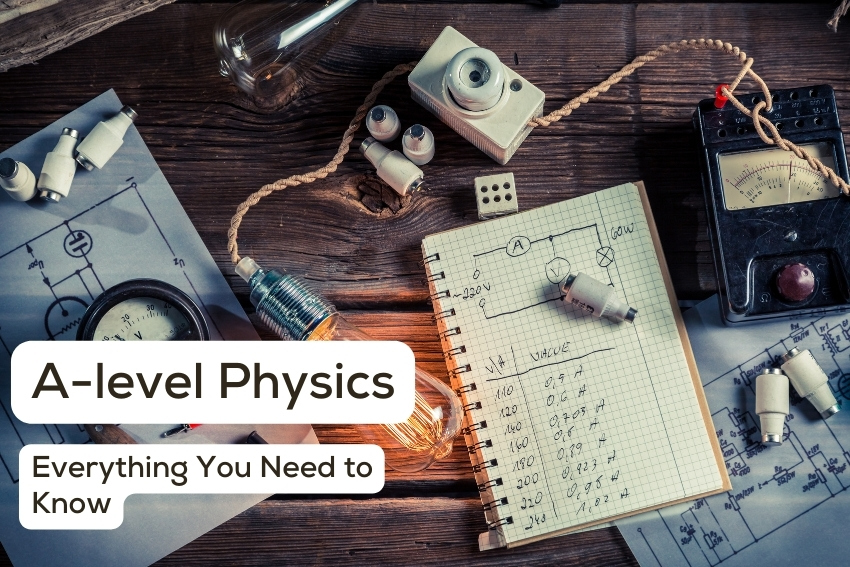A-level Physics – Everything You Need to Know
Navigating the complex world of A-levels can be a daunting task for any parent. When it comes to A-level Physics, the intrigue—and sometimes intimidation—reaches new heights. Far from the simplistic understandings of gravity or electricity many of us took away from our school days, A-level Physics plunges into the very fabric of the universe: from the tiniest particles to the expansive cosmos. This comprehensive guide aims to demystify key topics in A-level Physics, decode the grading scheme, and provide actionable insights into common difficulties your child might encounter. Whether you’re seeking effective revision resources or contemplating the benefits of specialised Physics tuition, consider this your essential roadmap for supporting your child’s A-level Physics journey.
Brief Overview of A-level
A-levels, short for Advanced Levels, stand as a milestone in the British educational system, bridging the gap between compulsory education and university. As part of the two-year course generally taken between the ages of 16 and 18, students typically choose three or four subjects, deepening their knowledge in each. A-level Physics is often pursued alongside other science and maths subjects, offering a rigorous exploration of fundamental principles that govern the universe. While it is lauded for its complexity and intellectual challenge, this subject is indispensable for those eyeing careers in engineering, healthcare, environmental science, or even finance. In the realm of A-levels, Physics serves as a potent launchpad for a broad spectrum of academic and professional paths.
A-level Grading Scheme
For those with a grounding in the A-level system, you’ll be aware that it uses a grading scale that ranges from A* at the highest, through A, B, C, D and E, down to a U for unclassified. But when it comes to A-level Physics, understanding the nuances of this grading scheme becomes especially crucial. The final grade is not merely a sum of your child’s performances across various papers but a holistic evaluation of their grasp on the subject. Assessments include written examinations covering theoretical concepts and problem-solving skills, as well as practical endorsements that are internally assessed but externally moderated. These components are aggregated to form the final grade, making each paper a critical piece of the overall academic puzzle.
Summary of Key Topics in A-level Physics

Physics is an expansive field, but A-level syllabi manage to zero in on a core set of topics. Your child will grapple with these subjects over two years, each offering a different lens through which to view the fundamental laws of the universe.
Mechanics
The bedrock of any Physics course, mechanics explores the forces, energy, and motion governing how objects interact. From Newton’s laws to complex equations of motion, this module lays the groundwork for understanding the physical world.
Electricity and Magnetism
Building on prior knowledge, this section delves into the phenomena of electric and magnetic fields, circuits, and electromagnetism. It’s where everyday appliances meet complex equations, providing a tangible context for abstract theories.
Waves and Oscillations
Whether it’s the visible light spectrum or sound waves, this topic explores the wave-nature of various phenomena. Students learn about wave characteristics, interactions, and even delve into the realm of quantum mechanics.
Thermodynamics
From absolute zero to the laws of thermodynamics, this module tackles the principles governing heat and energy transfer. A cornerstone for those interested in engineering or environmental science.
Modern Physics
Here, students confront the more recent advancements in the field, including particle physics, quantum mechanics, and cosmology. This module offers a glimpse into the frontier research areas that continue to challenge our understanding of reality.
Common Difficulties Encountered by Students
Though A-level Physics is a subject replete with exciting discoveries and intellectual rigour, it doesn’t come without its share of challenges. Even the brightest minds can find certain aspects perplexing, making parental awareness and support invaluable. Below are some common areas where students may struggle:
Mathematical Complexity
Physics and maths are closely entwined, and the advanced equations in A-level Physics can be daunting. Issues often arise when applying mathematical principles to real-world problems, requiring not just computational skills but also a deep understanding of the subject matter.
Abstract Concepts
From quantum mechanics to relativity, A-level Physics delves into some profoundly abstract ideas. These concepts can be challenging to grasp, particularly when they defy everyday intuition.
Practical Skills
Physics isn’t all theory; practical assessments contribute to the final grade. Students sometimes find it challenging to translate their theoretical knowledge into successful experiments, be it in measuring accurately or interpreting results.
Time Management
The sheer volume of material covered in A-level Physics can be overwhelming. Balancing this with other A-level subjects and commitments can create time-management issues, leading to inadequate revision and, subsequently, suboptimal performance.
Exam Techniques
Knowing the material is one thing; presenting it effectively in an exam is another. Students often struggle with structuring their answers, prioritising key points, or misinterpreting the questions, which can adversely affect their grades.
A-level Physics Marking Scheme and Objectives
A-level Physics assessments are designed to evaluate not just memorisation but also the comprehension, application, and integration of key concepts. For parents who have a basic understanding of the A-level system, it’s crucial to delve deeper into what exactly these exams aim to test and how they are marked.
Objectives
- Knowledge and Understanding: This tests the student’s grasp of the fundamental theories, laws, and principles in physics.
- Application of Knowledge: It’s not enough to just know the facts; students must be able to apply these in unfamiliar contexts.
- Analytical Skills: Ability to break down complex problems into manageable parts is crucial, especially in subjects like electricity and thermodynamics.
- Practical Skills: Assessed via lab work and written reports, this objective measures how well a student can carry out experiments and interpret data.
- Synthesis and Evaluation: This aims to test the student’s ability to bring together various facets of physics to form a coherent understanding, as well as to critically evaluate data and methodologies.
Marking Scheme
- Multiple Choice: Usually marked as either correct or incorrect. There’s little room for partial credit here.
- Short Answer Questions: These can earn partial marks for correct methodologies or partially correct answers.
- Long-form Questions: Often divided into several parts, these questions offer the most scope for partial credit. They are usually marked for both methodology and final answer.
- Practical Endorsement: Although this doesn’t contribute to the A-level grade directly, a ‘pass’ is usually required for many university courses. It’s marked internally but moderated externally.
- Marks Allocation: Marks are often allocated not just for the correct answer but for the correct working, units, and even significant figures in calculations.
By understanding the objectives and marking scheme, parents can offer more focused support in helping their children prepare for A-level Physics exams. It can also guide you in choosing the most effective revision resources or deciding whether specialised tuition could benefit your child.
Effective Revision Resources for A-level Physics


When it comes to acing A-level Physics, the right revision materials can make a world of difference. While your child will undoubtedly have textbooks and class notes, supplementing these with additional resources can deepen understanding and boost exam performance. Here are some highly recommended revision resources:
Textbooks and Revision Guides
- CGP A-Level Physics Revision Guide: Offers concise explanations and practice questions, making it an excellent supplementary text.
- Oxford AQA Physics A-Level: A more detailed approach with in-depth explanations, ideal for students who wish to delve deeper into concepts.
Online Platforms and Websites
- Physics and Maths Tutor: Provides an extensive range of past papers, model answers, and revision notes.
- Khan Academy: Though not A-level specific, it offers helpful videos on many physics topics, aiding in conceptual clarity.
Mobile Applications
- Gojimo: Tailored specifically for A-levels, this app offers quiz-style questions for quick revision on the go.
- Pocket Physics: Covers essential physics formulas and concepts, great for quick reference and last-minute revision.
Educational YouTube Channels
- A-level Physics Online: Offers a wide range of video tutorials covering the A-level Physics syllabus.
- MinutePhysics: Provides fun and engaging explanations of complex physics topics in minutes.
Practice Papers and Exam Boards
- Past Papers: Most exam boards offer past papers on their websites, which are invaluable for practice.
- Mark Schemes: Don’t neglect the corresponding mark schemes as they provide insights into how examiners allocate marks.
Formulae Sheet
In addition to the mentioned resources, an A-level Physics Data and Formulae Sheet is an indispensable tool for students. This sheet compiles all the essential formulas, constants, and data that students need to memorise for their exams. It serves as a quick reference guide, enabling students to efficiently recall information during revision sessions or when tackling practice questions.
Understanding which resources suit your child’s learning style can help maximise the efficiency of their revision time. Parents may also find these resources beneficial when looking to offer academic support at home or determining the need for additional tuition.
The Benefits of A-level Physics Tuition
For parents contemplating additional educational support for their children, tuition can be a game-changer, particularly in a subject as intricate as A-level Physics. Below are some key benefits of opting for specialised Physics tuition, along with a nod to the unique advantages of online tutoring.
Personalised Learning
Tutors can adapt their teaching style to suit your child’s learning preferences, ensuring that complex topics are delivered in an accessible manner. This bespoke approach can drastically improve understanding and retention.
Focused Attention
In a classroom setting, it’s not always possible for teachers to give individual attention to each student. Private tuition fills this gap, allowing for immediate feedback and personalised strategies to tackle problem areas.
Exam Techniques and Strategies
Tutors, often being examiners or teachers themselves, provide invaluable insights into exam techniques and marking schemes. This can significantly boost your child’s performance by teaching them how to structure answers and allocate time during exams effectively.
Flexible Scheduling
Especially with online tutoring, schedules can be incredibly flexible. Your child can learn from the comfort of home at times that suit them, making it easier to balance A-level studies with other commitments.
Advantages of Online Tutoring
- Convenience: No need for travel, making it easier for students to fit sessions into their busy schedules.
- Wider Choice of Tutors: Online platforms give you access to a broader range of experienced tutors, irrespective of your location.
- Resource Availability: Online sessions can easily be recorded, and digital resources can be shared instantly, providing students with valuable revision material.
Tuition can provide that additional layer of support and expertise that could be the difference between a good grade and an outstanding one. And with the advent of reliable online platforms, getting quality tutoring support has never been easier or more convenient.
Empowering the Next Generation of Physicists
As we navigate the ever-evolving landscape of A-level Physics, the role of parents extends beyond emotional and moral support to making informed educational choices. With subjects like Physics, which are not only academically demanding but also foundational for numerous career paths, taking an active role in your child’s education is paramount. It’s not merely about overcoming hurdles in electromagnetism or mastering quantum theory; it’s about instilling a love for learning, cultivating problem-solving skills, and fuelling curiosity that lasts a lifetime.
In this digital age, the barriers to premium education are being dismantled. A realm of possibilities, previously hindered by geography or scheduling conflicts, is now at our fingertips. This is where platforms like Edumentors shine. Their tutors, hailing from top UK universities, are not just academic experts but mentors who inspire. They’re on-hand to help your child not just reach but exceed their academic goals while boosting their self-confidence. It’s more than just tutoring; it’s a partnership aimed at unlocking your child’s full potential.
So, if you’re seeking a comprehensive approach to A-level Physics, one that melds academic rigour with personalised mentorship, look no further than Edumentors. Because the aim isn’t just to prepare for exams; it’s to equip our youth with the intellectual tools they’ll need to tackle the unknown challenges of tomorrow.









